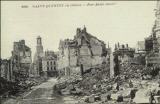horrors of war - more
The photograph shows some of the ruins of the city of Saint-Quentin after World War I. During these years, through countless letters Fr. Dehon tries to remain in contact with his confreres in the war and to comfort them. One of these young confreres is Paul Crépin (1893-1918), a former pupil of St. John and St. Clément/Fayet, who made his first vows in 1910 in Manage/Belgium. His letter from January 1918 is an impressive and touching document.
January 28, 1918
"Very Reverend Father...
We don't find any trench here, but only shell holes full of water, in a famous wood of which remains nothing any more but some miserable wretched stocks which the shells did not want to eradicate. All around us nothing but devastation: I cannot discover two meters of ground which hasn't been rolled over; old corpses that I commit myself to finally bury. Not far from us, the Germans [in French it's 'Boche', the insulting term for Germans at that time].
All that makes me prone to deep meditations. You wouldn't recognize any more the young shy person of former years! The war changed me quite a lot and made me the right man for the job: each thing has its time. For the moment it is the war; if I suffer sometimes it is because of the war, when I am lucky, it is still the war. Yes, it is tiring at the end, but I have such an aversion for the Germans [Boches] that I will never be able to see them even in a painting. Just in these days I've many occasion to face them, but is on order to avenge me. I am happy to belong to a corps which does not admit fraternization. And I am proud to be called, - because I didn't desire it - to inculcate my feelings in several other comrades. I do not run more risks for that. The experience is helping me and I believe that I am protected in a particular way. The war also helped me to know life and what life is about, in the presence of death.
Apart from these few hours of meditations I do everything to entertain my comrades. It is a beautiful apostolate, after more than three years of war. You can be sure, that I will do my duty. I leave you with regret. It is the service which calls me! But when will I be able to see you again?" (Arch. Dehon. inv. 0067104)
Five months later, in one of the last great battles in the department of Aisne, at the age of 25 years, and just four months before the end of the war, Paul Crépin is killed in battle.
